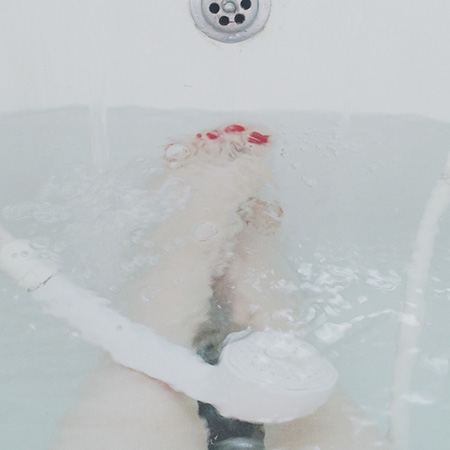How to Choose a Home Water Filter: 5 Easy Steps
 Drinking or bathing in contaminated water can make you sick. Even though the Environmental Protection Agency regulates water quality in the USA, there are many households and local communities with nasty chemicals and microorganisms in their water. That’s why it is important to make sure that you choose a water treatment solution that’s right for your home.
Drinking or bathing in contaminated water can make you sick. Even though the Environmental Protection Agency regulates water quality in the USA, there are many households and local communities with nasty chemicals and microorganisms in their water. That’s why it is important to make sure that you choose a water treatment solution that’s right for your home.
Choosing the best water filter can feel overwhelming when you look at all the available options. Answering these 5 questions can help you narrow down your choices and find the perfect water filtration system for your home.
1. What’s your water’s quality?
Finding out what is in the H2O running out of your faucets is the most important step in this process. Water can play host to a wide range of minerals, chemicals, and microorganisms. More than 10 million Americans have lead pipes in their homes that could contaminate their water. Studies have found that E. coli and coliform bacteria are in up to 40% of private wells in the USA. The best filter for your home is one that will effectively remove the contaminants that are hiding in your water.
If your water is provided by a local water utility, you can check the Annual Water Quality Report on the utility’s website. According to EPA guidelines, they must have the water tested regularly and provide that report to the public. It will list all of the chemicals, minerals, and microorganisms found in the water and the levels of each. Unfortunately, this report may not show you everything that is in your water. It is based on water in the treatment center. Water can pick up contaminants–like lead–through pipes in your home that will not be in the report. Testing your water is the best way to know what is hiding in it.
Well-water is unregulated. The only way to know what is in it is to have it tested.
Tri-Florida Water Treatment provides free in-home water analysis so you can find out exactly what is in your water. If you aren’t in the Lakeland area, you can try a home testing kit or find a local water testing facility through the EPA’s website.
2. Do you want to filter all the water in your home or only drinking water?
There are two different kinds of filtration solutions: point-of-entry (POE) and point-of-use (POU).
Point-of-use filtration solutions only purify water from one source or faucet. Under-the-sink and water pitcher filters are both POU systems. These types of filters are primarily used for drinking water.
Point-of-entry filtration solutions purify all the water that passes through your home. These are also known as whole house filtration systems. These types of filters are used to purify the water that you use for cleaning, cooking, bathing, and drinking.
A filter under your kitchen sink is a good solution if you are only concerned about treating your drinking water. If you’re worried about the water you use for cleaning and bathing too, a whole home filter is a better choice.
3. How much water do you use?
 Filtration solutions come in many different sizes. They also can filter water at different rates. Determining your household’s water usage will help you pick a filter with the capacity to process and store enough water for your home. The simplest way to determine if you use a high or low volume of water is to add up the number of people and bathrooms in your household. If you live alone in a 1-bathroom home, your water usage will be minimal. If you live with 4 people in a 3-bathroom home, your water usage will be much higher.
Filtration solutions come in many different sizes. They also can filter water at different rates. Determining your household’s water usage will help you pick a filter with the capacity to process and store enough water for your home. The simplest way to determine if you use a high or low volume of water is to add up the number of people and bathrooms in your household. If you live alone in a 1-bathroom home, your water usage will be minimal. If you live with 4 people in a 3-bathroom home, your water usage will be much higher.
4. What’s your budget?
There are two different costs to take into consideration when determining your budget for a water treatment system: upfront costs and maintenance costs. POE solutions are less expensive to purchase but the cost of replacing the filter cartridges adds up. Water pitches with carbon filter need new filter cartridges every 2 months. Whole home water solutions are more expensive to purchase and install but the filter cartridges only need to be replaced every 12 to 24 months (depending on the type of filter). Pick a solution that fits best into your budget.
5. What filter best needs your needs?
It’s time to start comparing filters now that you know what is in your water, how much water you use, what your budget it and whether you want a POE or POU solution. There are many different kinds of filters such as sediment filters, carbon filters, UV filters, and reverse osmosis filters. Reverse osmosis filters are the most popular but each one has strengths.
To figure out the best filter to rid your water of contaminants, you can check out NSF International’s comprehensive chart. It lists the best water filter to remove particular contaminants. Or you can speak with a water treatment expert. Our experts at Tri-Florida Water Treatment are the Department of Environmental Protection Certified Water Plant Operators. We would be happy to share our knowledge with you and help you find the best water filtration solution for your home.
